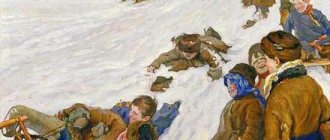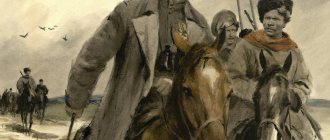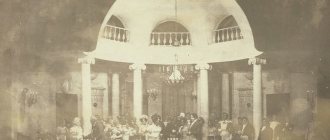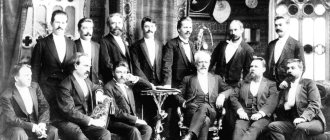- Poetry analysis
- Bunin
- Evening
The poem “Evening” by Ivan Alekseevich Bunin represents the author’s leisurely reflections on happiness. At the beginning of the work, he emphasizes the idea that for many people the best moments of life are connected with the past. At the same time, the author strives to prove the existence of happiness in any familiar environment or thing at the present time. Looking around, he sees a seemingly everyday gray picture: “The window is open. A bird squeaked and sat on the windowsill.”
Among earthly sensations, one can feel his fatigue after a working day (“I look away for a moment with my tired gaze”). But when distracted from his studies, he chooses a different direction of thought. It encourages you to think that a person is able to independently create such conditions so that there is a desire not only to turn to old memories, to a memory that has stored unforgettable moments, but also to be able to make amazing discoveries for oneself in the future.
The completeness of filling the inner world with a feeling of satisfaction depends on the magnitude of a person’s desires. I.A. Bunin notes that being in a state of harmony of soul and body is available to everyone who knows how to enjoy life, find a source for this, radiating positivity: “We see little, we know, but happiness is given only to those who know.”
The lyrical hero dissolves in nature. He watches the cloud, knows how to enjoy the garden and clean air. Phenomena in which he sees something memorable evoke a storm of positive emotions in his soul. The evening period associated with such observations is characterized by a surge of emotions that cause a feeling of happiness. To feel it, the author suggests, using personal example, to take a break from ordinary affairs, to make sure that true peace and happiness lives very close by in this huge world. You just need to look at it.
With the onset of evening, he merges with nature. A detailed description of the surrounding world replaces the enumeration of phenomena that prove the onset of evening (“The sky is empty”), and the dull sounds of a threshing machine are heard. The end of the poem is filled with calm and mystery. These feelings arise from the repeated use of the word “happiness.” Verbs that have a connection with the human organs of vision and hearing (“see”, “hear”, “know”) speak of a person’s sensory perception of the entire diversity of the world. This is a great gift that must be used to better recognize nature, yourself, in order to be able to appreciate happy moments.
The smooth sound of the poem is associated with the simplicity and clarity of presentation. Excitement manifests itself at the moment the author acknowledges an endless sense of satisfaction with life in the last line of the work.
Means of artistic expression
In a small poem, the poet uses a unique synthesis of means of artistic expression. By the will of the author, one trope becomes part of another, creating a harmonious picture of what is happening.
The poet personifies natural phenomena with the help of a metaphor: “the sea does not sway during the day” and epithets: “the shadow quickly, silently lies down.”
In each stanza he uses unusual comparisons: “the ringing of a bell, like the noise from a flock of cranes,” the evening “like the spring sea in flood.”
Coming together, the means of artistic expression help the reader understand the interconnection of natural phenomena.
Analysis of the poem Evening of Bunin
Ivan Bunin is undoubtedly one of the most brilliant landscape poets. All his works became surprisingly sensual and filled with meaning. This poem is no exception to this. This text was written in 1909. and is an example of the poet’s landscape and philosophical lyrics. The theme of this poem is happiness. The main idea is that happiness is available only to those who are able to discern it, and in seemingly simple things.
Conventionally, the poem can be divided into four parts, in each of which the lyrical hero gradually finds the answer to the question he asked himself: “What is happiness?”
The lyrical hero appears before us in a rural landscape. The sounds and smells of rural life rush through the open window and, distracting the hero from paperwork, immerse him in philosophical reflections. In the first part of the text, the very question of happiness arises. And then the poet suggests what it might be. In the beauty of the garden or in the sweet purity of the evening air. In the second part, our thinker comes to the conclusion that despite our knowledge, we do not notice anything and do not really know. Undoubtedly, here Bunin is talking about our ignorance of simple truths, which are revealed further in the text. A bird suddenly flies into an open window, which personifies the whole vast world that is accessible to each of us and, as if waking up the lyrical hero from sleep, calls him with his squeak to take a better look at the reality around him.
And as if having gotten rid of the veil of life’s troubles, the bustle of work, a beautiful firmament, clear of clouds, opens before the hero’s eyes. He hears the faint sound of a threshing machine. The lyrical hero sees, feels, touches this world in all its unique charm and understands that this is the truth in which happiness is hidden. It is to enjoy every day you live, to be able to catch such fabulous moments, to feel them, and not to forget about all this amid the bustle of life. The lyrical hero is overwhelmed with a feeling of happiness, he says: “Everything is in me!”, as if he managed to contain the entire universe within himself. But it is true that who, if not a poet, a spiritually highly organized person, is able to recognize the voices of this world, and then convey them to us, the ordinary people, through his creativity.
Detailed analysis
The work is a poem related to the poet’s landscape lyrics with elements of philosophy, considering the problem of human happiness as the main theme.
The compositional structure of the poem consists of four parts, in which, in the image of a lyrical hero, the poet tries to understand what the feeling of happiness consists of.
The poet describes the image of the lyrical hero in the image of a rural landscape, the sound and aroma of which the hero hears and observes, plunging into thoughts about happiness. The character appears as a poet tired and suffering from his lonely life, conveying his own feelings and experiences to a white sheet of paper, while enjoying the purity and beauty of the night air, peering into the empty sky and listening to the distant roar of a threshing machine.
A distinctive feature of the poem is the poet’s use of various versification techniques, expressed in the first stanza of the poems in the form of quatrains, while the next three stanzas consist of three lines. In addition, the poem is written in iambic pentameter, combined with cross rhyme and alternating feminine and masculine rhymes using pyrrhic (a poetic foot of two syllables). However, the stylistic content of the poem lies in the simplicity of presentation with the inclusion of only a small number of tropes. The use of these literary techniques and means allows you to fill the content of the work with original rhythm and smooth phrases.
A striking illustration of the work’s expressive means is the author’s use of artistic means in the form of epithets, metaphors, comparisons, emphasized by a series of inversions, consisting in the direct order of words and phrases, as well as emphasizing short and long poetic lines.
The narrative of the work is carried out by developing an antithesis about the author's regrets about the short duration of happy moments of life, in which a person does not realize the feeling of happiness, but remembers them only after they are over.
At the end of the poem, the poet concludes that life provides the opportunity for a person to feel every second the happy and unique moments that everywhere accompany people endowed by fate with the ability to feel, love and thank. The lyrical hero is confident in the meaning of the inner world of a person, rich and multifaceted, filled with numerous sources of feelings of happiness.
Analysis of the poem Evening as planned
Brief Analysis
History of creation
– The poem was written in 1887.
Theme of the poem
– Priceless childhood memories that every person has in their memory bank.
Composition
– The work is divided into three main parts.
Genre
- Lullaby.
Poetic size
– Trochee using masculine rhyme and cross rhyme.
Metaphors
-
“indistinct noise of birches”, “golden waves of rye”, “whisper of the wind”.
Epithets
– «
quiet", "indistinct", "mid-day summer
».
Personifications
– «
the storm is crying”, “the blizzard is howling”, “the waves are moving
».
Lyrics by Afanasy Afanasievich Fet
Fet has long been recognized as a famous and talented lyricist and poet.
His work has often been compared to the work of an artist. This is evident in the poem “Evening”. The author, with the help of words, like an artist with paints, tries to realistically and naturally recreate a unique and inimitable picture of nature, which will never be the same again. At the same time, Afanasy Fet tried not only to convey in words all the beauty of the environment, but also to describe the sensations that were in his soul, the feelings that are characteristic of every person. In the poems of Afanasy Afanasyevich one cannot find a description of social problems, questions about politics or modern events. Sometimes, reading the poems of this author, one gets the feeling that he was not at all worried about what was happening here and now. It was precisely because his poems were far from modernity, gentle and lyrical, that the poet, as a representative of “pure art,” was often condemned and ridiculed by revolutionary democratic literary figures.
Ivan Bunin - Evening: Verse
We always only remember about happiness. And happiness is everywhere. Maybe it’s this autumn garden behind the barn and the clean air flowing through the window.
In the bottomless sky, a cloud rises with a light white edge and shines. I have been following him for a long time... We see little, we know little, And happiness is given only to those who know.
The window is open. A bird squeaked and sat on the windowsill. And I take my tired gaze away from books for a moment.
The day is getting dark, the sky is empty. The hum of the thresher is heard on the threshing floor... I see, I hear, I am happy. Everything is in me.
Option #3
I. A. Bunin’s poem “Evening” was published in 1909. It was written in the genre of landscape and philosophical lyrics. This direction has become the author's calling card. His works always reflect the feelings experienced by the poet at the time of writing.
The lyrical hero of “Evening,” like I. A. Bunin himself, is very tired and suffers from loneliness. He has no one to tell about his feelings, and he can express his experiences only on a white sheet of paper.
He is immersed in thoughts about happiness. In the first lines, the hero reflects on the search for happiness in a global sense, while he says that happiness lies in the beauty of the world around him. However, not everyone can see this beauty. Immersed in problems, people do not observe the world around them, which is why happiness seems fleeting and unattainable to them. But the author does not blame anyone for this, noting that due to work, he cannot always enjoy the surrounding nature. This is emphasized by the contrast “We always only remember about happiness. And happiness is everywhere.”
In the last stanza, the hero comes to the realization that happiness is hidden in the soul of each of us, and to find it, there is no need to fussily wander around the world. You just need to look inside yourself. Every moment you live is a gift from above, so you just need to enjoy life.
The poem includes four stanzas. It is interesting that the first stanzas are quatrains, and the last ones consist of only three lines. The author uses iambic pentameter with pyrrhic and cross rhyme with alternating masculine and feminine rhymes, characteristic of most of his poems.
Despite the simplicity of speech, the poem is filled with many expressive means. These are epithets (“bottomless sky”, “tired gaze”), metaphors (“air flowing through the window”), comparisons. The restlessness of the lyrical hero’s thoughts is emphasized by the alternation of inversions with direct word order. For the same purpose, the author uses both long and short lines.
Briefly according to plan
Composition
The first part of the work consists of one stanza and is filled with impersonal sentences. They help Afanasy Afanasyevich create an atmosphere of mystery and show how mysterious the natural world is.
But the second part, consisting of two stanzas, is precisely an attempt to solve this riddle. The reflections of the lyrical hero, based on visual impressions, are revealed in a more traditional way. The author paints a beautiful picture of nature in the evening, when everything is gradually falling asleep on one side, and as if anticipating the morning on the other.
It is obvious that the lyrical hero sees the whole picture unfolding in front of him from a hillock, where it is either hot or damp (obviously from the wind from the river). This allows him to see more as if he were a direct participant. This look “from above,” slightly detached and at the same time intent, is typical of Fetov’s poems. It was thanks to him that the composition was formed: at first the lyrical hero sees and hears something unclear, but, having looked closely, he can solve at least part of the natural mysteries. In this way, Afanasy Afanasyevich conveys his philosophical idea.
Subject
The central theme of the work is bright childhood memories. It is dedicated to one’s father’s home, a loving mother, a carefree childhood, from the memories of which one can subsequently draw strength and energy to help overcome all life’s adversities.
The poem turned out to be very touching and heartfelt. With his work, the poet managed to reach millions of hearts, since this topic is close and understandable to all people who had a happy, serene childhood. Reading the lines of this poem, everyone remembers mother’s affectionate hands, soothing whispers and that amazing feeling of calm and security that only happens in childhood.
History of creation
Ivan Alekseevich was passionate about poetry since childhood, and from an early age he enthusiastically wrote poetry. By the age of seventeen, the gifted young man published his works in magazines, receiving the approval of literary critics. The young poet was so inspired by his first serious successes that he had no doubt which path in life he should choose.
Having matured, Ivan Alekseevich became more restrained in the manifestation of feelings, but the early period of his work fascinates with the amazing lyricism and sentimentality of his works.
The poem “I remember a long winter evening,” written in 1887, also belongs to such works. It’s surprising that a seventeen-year-old boy touched on the topic of childhood. Perhaps the impetus for writing the poem was the author’s state of mind, in which he again wants to feel like a little child, reliably protected from everyday storms by his mother’s love.
Poems by Bunin
Ivan Bunin began his work in a rather versatile way. Even before he became a writer and journalist, the writer was engaged in poetry, which he was really good at. Each poem written by Bunin does not easily describe the beauty of nature. His poems contain sacred meaning. Each work is filled with various philosophical thoughts of the writer, feelings that he experienced at one time or another in his life. As an example, we can cite the following works by Bunin: “Roses”, “Childhood” or “Evening”.




